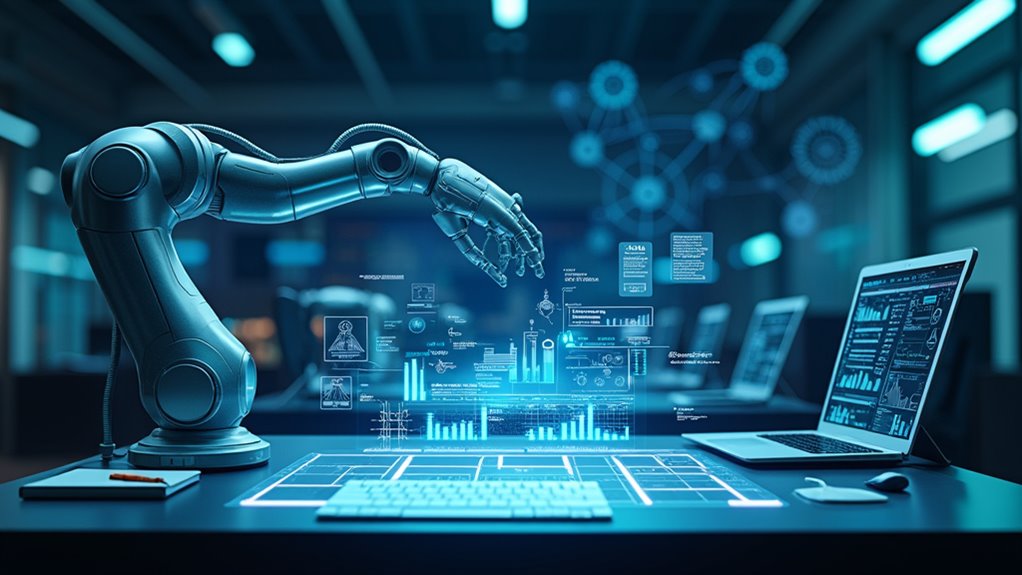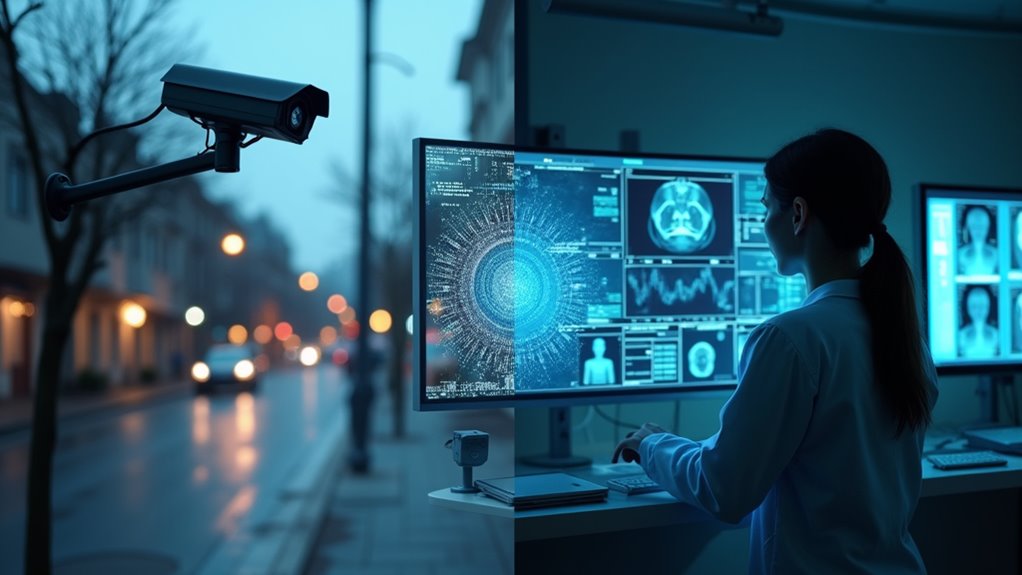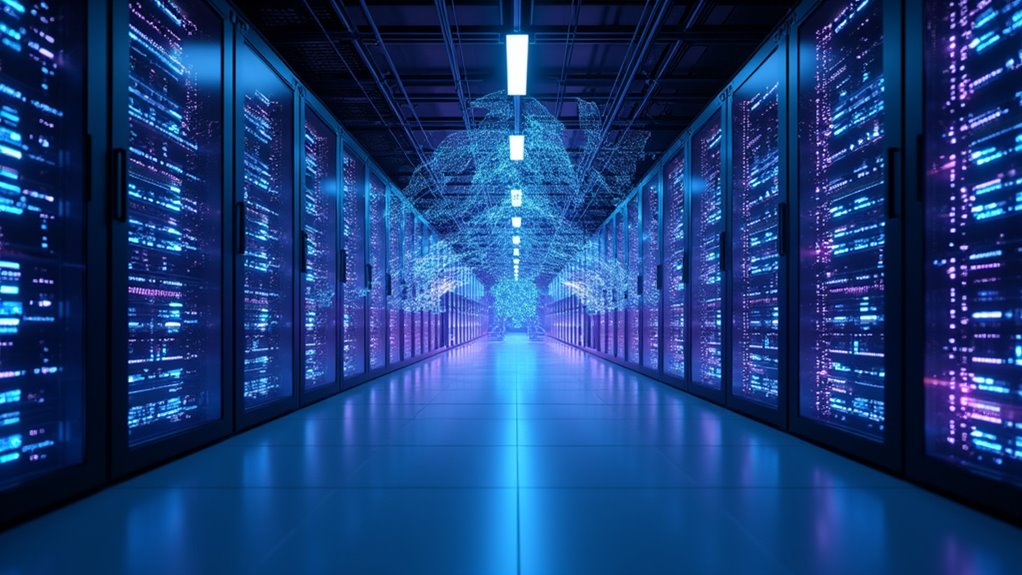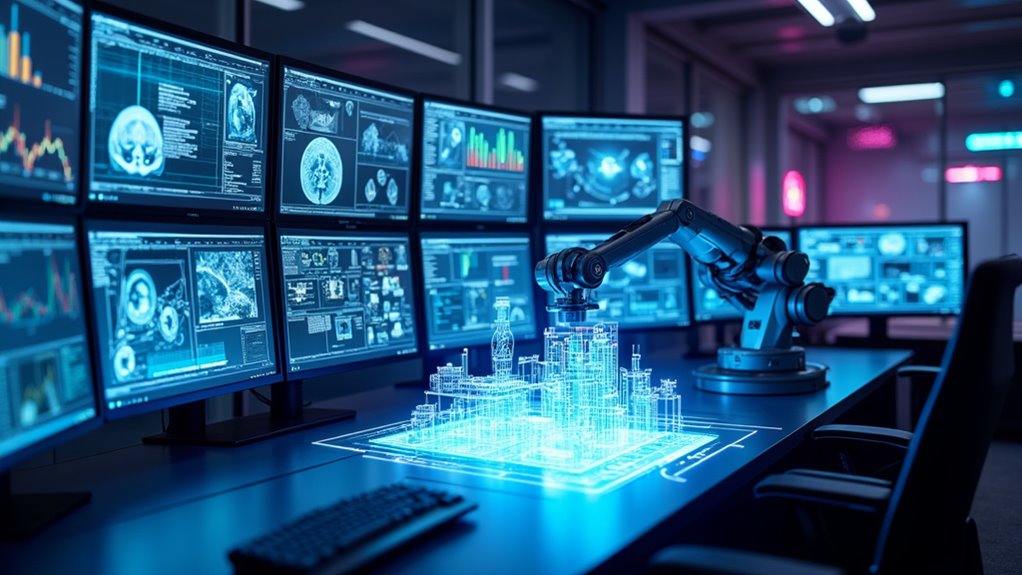Open source AI democratizes advanced technology by making code, weights, and sometimes training data freely available to everyone. Unlike proprietary systems, it encourages global collaboration, reducing barriers for smaller organizations and fostering innovation across industries. Yes, challenges exist—from ethical concerns about bias to data privacy hurdles and environmental impacts. But this approach fundamentally reshapes how intelligence is created and shared, leveling the playing field for developers worldwide. Stick around to discover how this revolution might transform your technological future.

While proprietary AI models continue to dominate headlines, Open Source AI represents a revolutionary approach to artificial intelligence development that’s changing how technology evolves. At its core, Open Source AI involves developing and sharing AI technology with open access to critical components like source code, model weights, and sometimes training data. This approach guarantees fundamental freedoms that proprietary systems don’t: the ability to use, study, modify, and share AI systems without seeking permission.
Community contributions form the backbone of Open Source AI’s success. Developers worldwide collaborate to improve models, fix bugs, and expand capabilities—making AI better for everyone, not just those who can afford expensive licenses. Open source AI significantly reduces barriers to entry for newcomers and smaller organizations looking to develop their own AI solutions. This democratization creates a more level playing field where diverse applications can flourish across multiple industries.
But let’s not kid ourselves: ethical considerations remain a thorny challenge. Many “open source” models still lack transparency about their training data, raising serious questions about bias and representativeness. You can’t fix what you can’t see.
The ecosystem supporting Open Source AI continues to grow impressively. Platforms like Hugging Face and tools like TensorFlow, OpenCV, and LangChain give developers powerful resources to create AI applications without starting from scratch. These aren’t just toys—they’re professional-grade tools powering real-world applications.
Data governance presents perhaps the biggest hurdle. How do you balance openness with privacy? Personal data laws make sharing training data complicated, and copyright issues remain unresolved. The proposed “data commons” model attempts to thread this needle by creating shared resources with clear stakeholder rights. This approach emphasizes responsible governance of data rather than treating it as a resource to exploit.
Environmental impacts can’t be ignored either. AI’s computational demands are enormous. Want to help? Start by supporting smaller, localized models rather than resource-intensive behemoths.
Despite these challenges, Open Source AI continues to democratize access to cutting-edge technology. It’s pushing the field toward greater transparency, accessibility, and community engagement. For developers, researchers, and everyday users, this movement represents not just a different licensing model, but a fundamentally different approach to how we create and share intelligence in the digital age.
Frequently Asked Questions
How Do Open Source AI Models Compare to Proprietary Ones?
Open source AI models offer significant advantages like transparency, customizability, and lower initial costs—democratizing innovation across organizations of all sizes.
Meanwhile, proprietary solutions present limitations through high licensing fees and restricted code access, though they typically provide better security protocols and formal support structures.
Open source fosters community collaboration but requires more technical expertise, while proprietary options deliver turnkey solutions with consistent performance.
Your choice depends on balancing resource constraints against specific needs for control, security, and support.
What Are the Security Risks of Democratized AI Access?
Democratized AI access creates serious security hazards. Malicious use becomes easier when anyone can access powerful models—think deepfakes and automated phishing campaigns.
Data privacy concerns skyrocket as sensitive information might be extracted from models trained on personal data. Without proper guardrails, these tools can power disinformation campaigns or cyberattacks.
The lack of accountability in open environments means bad actors can exploit vulnerabilities while remaining anonymous. Scary stuff, right? Yet this is our current reality.
Who Regulates Open Source AI Development?
Open source AI regulation comes from multiple sources, not just governments.
Community governance plays a critical role through organizations like the Open Source Initiative, which establishes licensing standards that developers must follow.
Traditional regulators like the EU (with its AI Act) create frameworks that apply even to open-source projects.
Self-regulation through ethical considerations drives many development communities to adopt voluntary standards for responsible AI development.
Bottom line? It’s a patchwork of official rules and community norms.
Can Businesses Reliably Depend on Open Source AI Solutions?
Businesses can indeed rely on open source AI solutions, but it’s not all sunshine and rainbows. The business advantages are compelling—cost savings, customization flexibility, and access to innovation without breaking the bank.
However, implementation challenges lurk around every corner. Technical complexity demands skilled teams, security vulnerabilities require vigilant monitoring, and long-term maintenance isn’t free.
Success depends on strategic integration: carefully evaluating tools, maintaining version control, and investing in proper documentation and training.
What Technical Skills Are Required to Use Open Source AI?
Using open source AI effectively requires several technical competencies. Proficiency in programming languages like Python is essential—it’s not just nice-to-have, it’s non-negotiable.
Users need data analysis skills to prepare and understand datasets before feeding them to models. Basic machine learning knowledge helps in selecting appropriate algorithms for specific problems.
Model training expertise allows for tuning parameters and optimizing performance. While open source democratizes access, these skills form the entry ticket to meaningful AI implementation.









